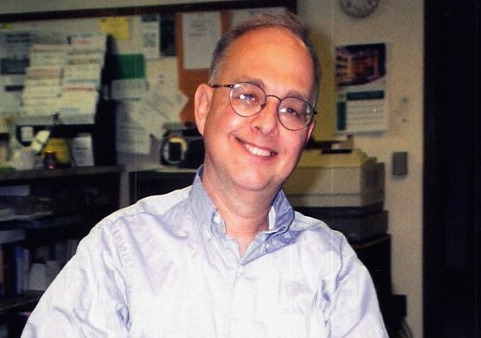
His Love of Movies
Written by Cheryl Eagan-Donovan | Posted by: Anonymous
Boston Phoenix film critic Gerald Peary and producer Amy Geller have teamed up to document the history of American film criticism in their film For the Love of Movies. I’d read Peary’s film reviews for years but only met him in March at the South by Southwest Film Festival. Standing in line for the premiere of LoudQUIETLoud, he told me about his film. Last month in Central Square, after his daily basketball game at the Cambridge Y and before heading off to correct papers at Suffolk, he told me more about his love of movies.
Cheryl Eagan-Donovan: How did you get involved in film criticism?
Gerald Peary: I always was a film watcher, from early childhood, and from my early teenage years, an avid reader of film criticism. I started writing film reviews for the University of Wisconsin Daily Cardinal as a grad student, procrastinating writing my Ph.D. thesis.
CED: Tell me about the WGBH Filmmaker-in-Residence program.
Peary: The LEF Foundation is our patron saint. They sponsor the program. We would not be showing the rough-cut version of the film now without the support of the LEF and the WGBH Filmmaker-in-Residence program. It was really great, especially being able to talk to the WGBH lawyers about fair use issues. The film contains lots of archival footage.
CED: What percentage of the film is made up of archival footage and how much is new footage — interviews?
Peary: It’s 20-25 minutes of clips, out of 70 minutes total. The catch-22 is that lots of people are quietly showing films at festivals, and even theatrically, with footage that hasn’t been cleared, but the one place where you actually get back some of your money is television, and any television broadcaster will insist that everything be cleared. PBS seems to be taking a leadership role on this issue. There are some shortcuts I’m learning. If a film was made before 1924, it’s outside of copyright laws, and you can use film trailers pre-1963. I’ve made creative use of the resource archive.org as well.
CED: What were some of the most interesting interviews you did?
Peary: Most of the interviews are with working film critics. We went to people’s houses and interviewed them there; we went to film festivals and stopped people on the street. The key person is my wife, Amy Geller, the producer and at times, a reluctant cameraperson. We went to Cannes last year and we weren’t really allowed to film there so we set up in one room, and when film critics wandered into this room, we would drag them over and interview them.
I chose the critics I interviewed because they can tell the stories I need about earlier critics. I interviewed John Waters about Parker Tyler, a film critic who was well known during the 1940s and 1950s. I have footage of Robert Towne talking about film criticism in the 1970s. The biggest missing gap in the history is Manohla Dargis, the New York Times critic. She is a very private person and I’ve been trying to convince her to let me use some footage of her talking about Jim Jarmusch films. A. O. Scott, critic for the New York Times, now has a myspace.com page. He is the first nationally known film critic to go this direction.
I interviewed Roger Ebert four years ago in his old studio right before it was torn down, where the Kennedy-Nixon debates were held. That was wonderful. The interview that thrilled me most was with Stanley Kauffmann, critic for the New Republic since the 1950s. When I interviewed him, he was 85 years old. He is a major American intellectual, a great, learned man and talking to him was absolutely a pleasure.
CED: What is the biggest difference between writing reviews, screenplays, books, and directing a film?
Peary: I think being a writer helps. After all these interviews, I still have no idea where to put the camera, but I think I’m really good in the editing room. I’m good at structure. I understand rhythm and the sound of words. From the millions of movies I’ve watched, my understanding of the language of cinema makes the editing room a comfortable place. I like shooting too. Somebody else operates the camera, but I look at the framing of the shot. I don’t know any of the technical stuff but it’s definitely fun shooting movies.
CED: You have Sabrina Zanella-Foresi as your editor?
Peary: Sabrina was our editor, but she has moved on to another project because our budget only allowed us to use her for a few wonderful weeks. She’s a fantastic editor. Now we are working with Aleksander Lekic, who is from Serbia. He was one my students at Suffolk University, who came here as an immigrant. He’s enormously hard-working, and does often what he should, and stubbornly: challenges his director when the image isn’t quite right, or when the voice-over needs even a slight bit of tweaking
CED: How long have you been at Suffolk?
Peary: Since 1981. I’m head of the film program there. I moved to Boston in 1978, and was hired to be the first-string critic for The Real Paper, the other alternative weekly newspaper that was the rival of the Boston Phoenix. The Real Paper folded in 1981. For the last 10 years, I’ve written for The Phoenix.
CED: Have you collaborated with Amy before?
Peary: No. She’s the real professional. I’m a total amateur. This is my first film. I’m lucky because besides being my wife, she’s an extraordinarily experienced and terrific producer. She has done extensive work for both PBS and American indie films. Last year she was line producer for a big project, The War that Made America. So I’ve been learning from her how to make a movie. I knew nothing about budgets and the horror of how expensive filmmaking is.
CED: What was the genesis of the film?
Peary: Canadian filmmaker Ron Mann came up with the idea over lunch. I had worked as a story editor on two of his films. He said, "You’re the right person to make this film." Ron was the executive producer and I was the director/writer for hire. Today, nobody is putting advance money into films. Ron couldn’t finance it and got involved in another project, and at that point, I was faced with the choice of either dropping the project or buying it from him. I bought footage from the first few shoots and since then I’ve done lots of other shoots.
CED: How did you find Desson Thomson who is writing the score for the film?
Peary: In a perfect world I would have film critics do everything on the movie. Desson is a critic for the Washington Post who is also a rock musician. He has a successful rock band. This is his first film score.
CED: Are you planning to do the festival circuit?
Peary: Yes, this film will play lots of festivals, and museums. People are asking me about it already. I went to the opening of ICA and right away the film curator asked me "When will your film be finished?" We’ll have no trouble finding venues. There will be trouble trying to find someone to buy the film, to help pay for post-production. I’m sure that if we finish the film, someone will broadcast it. We’re applying for PBS grants and the ITVS open call. It’s a natural for PBS but we’ve also been talking to Turner Classics. Those are the two most obvious choices. It could play on the Sundance Channel or Starz, stations that don’t have major budgets. So we’re talking to a few different people but there’s always the question of when to show your hand. I think we showed it too early a few times because I now see how much better the film is.
CED: Maybe that’s something that you can only learn for yourself as a first-time filmmaker. You feel good about the film now?
Peary: I really feel happy about the first half-hour. There are some minor issues so we’ll be glad to hear some feedback at the rough-cut screening. I think it flows as a film, between clips, history and interviews.
CED: What do you think about the changing nature of film criticism, especially all the online reviews?
Peary: That’s been the big issue in the last year or two, whether film criticism is a total fossil. Does film criticism in print form, written by people with lots of experience, count at all anymore? We’re in a world where everyone’s a critic. The main figure in the last part of the movie is Harry Knowles of Ain’t It Cool News. I interviewed him at his house in Austin, Texas. He claims zillions of readers every day, he’s on every television show, and Hollywood asks him what he thinks about everything. He’s seen a lot of movies. I’ll give him credit for that, but he has youthful taste. One of the really interesting issues is whether critics who’ve been critics for 20 or 30 years can write with sympathy about films that young people like today. I think that’s a valid question.
I’m an old guy. I have to believe that the thousands of films that I’ve seen, and the thousands of things I know about the world, count in the reviews I write. There are lots of movies that I have no entry point for. I can’t stand action pictures. I can’t stand digital special effects. They mean absolutely nothing to me. I’m an adult and my interests are post middle age. Still, people on the Internet clearly are in touch with young audiences.
CED: How did you meet indie film guru John Pierson?
Peary: He knew who I was but this year I introduced myself to him in Austin at the South by Southwest Film Festival. I invited him to speak at Boston University’s Cinematheque program. He and his wife Janet volunteered to come and look at my film. I was embarrassed. Happily, they seemed to really like it. That was a big moment, to get someone with that knowledge to look at the film, and I think his enthusiasm was sincere.
One of the differences between Boston, and Austin, where Pierson lives and teaches, is the attitude toward financing films. The opening night party for the South by Southwest Film Festival was a barbecue with old tables and chairs, very informal, and I sat down with some local guys who had each spent $5,000 to be there, to support film in Texas. In Boston, I’m still trying to find a rich patron who wants to travel the world with Amy and me, as Executive Producer, attending hundreds of film festivals for the cost of a condo.
Cheryl Eagan-Donovan is a documentary filmmaker and writer based in Boston and can be reached at www.controversyfilms.com. Her second feature, Nothing is Truer than Truth, is in preproduction.
For the Love of Movies: The Story of American Film Criticism will be presented as a work in progress at the Bernard Toale Gallery as part of the Center for Independent Documentary’s Filmmakers Workshop series on January 17th. The workshop is free but reservations are required because space is limited. Contact Susi Walsh at susi@documentaries.org or at (781) 781-3627 to RSVP. For more about the film, go to www.geraldpeary.com. Cheryl Eagan-Donovan is a documentary filmmaker and writer based in Boston and can be reached at www.controversyfilms.com. Her second feature, Nothing is Truer than Truth, is in preproduction.









